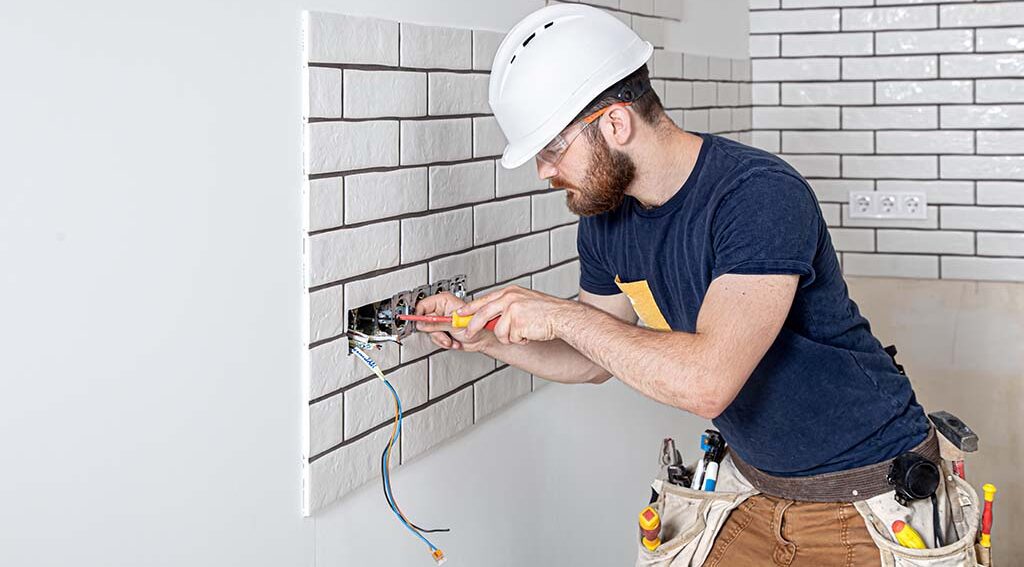From home EV chargers to solar panels and smart heating systems, the UK electrical trade is experiencing unprecedented demand. With over 1.3 million consumer searches for electricians on Checkatrade in 2024 alone, it’s clear that customers are actively looking for trusted professionals. This surge is being driven by new laws, green tech trends, and shifting homeowner and business priorities.
For electricians—whether you’re a sole trader or running a small firm—there’s never been a better time to refine your offerings. This guide breaks down the most in-demand services for 2024–2025 across domestic, commercial, and new build markets. Use it to identify new opportunities, get qualified where needed, and ensure you’re offering services customers are actively seeking.
Top services in demand: Overview
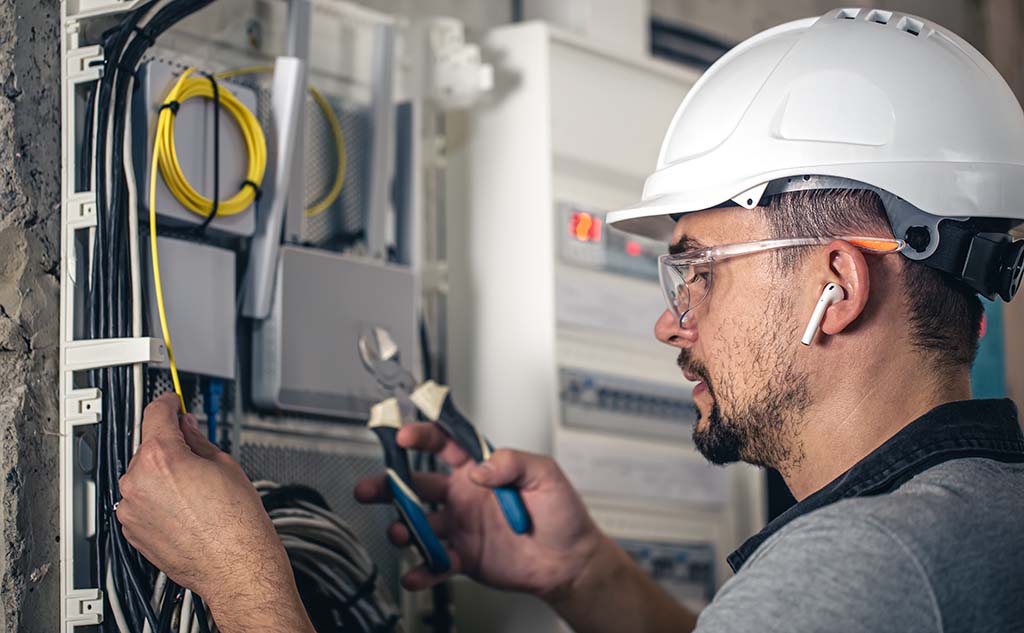
| Rank | Service | Key Drivers |
| 1 | EV Charger Installation | EV boom, building regs |
| 2 | Solar PV + Battery | Energy prices, green incentives |
| 3 | EICRs + Consumer Unit Upgrades | Legal compliance, aging stock |
| 4 | Smart Home Tech | Convenience, energy saving |
| 5 | LED Lighting Retrofits | Ban on fluorescents, cost-cutting |
Residential sector
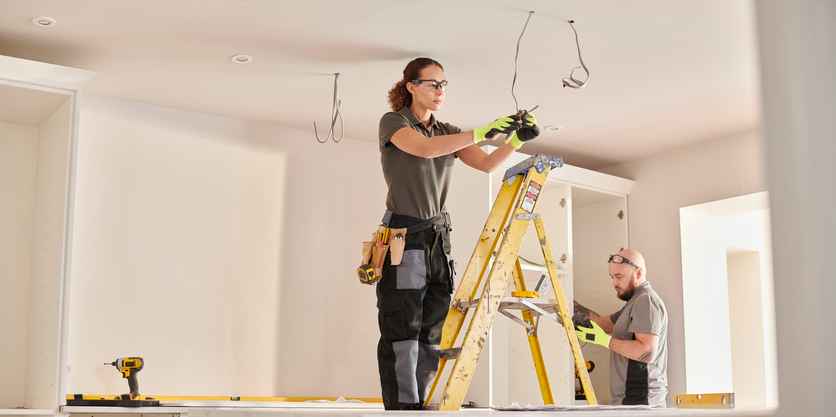
Here’s a breakdown of the key areas where residential demand is strongest right now – and where your skills are most valuable.
1. EV Charger Installation (Home)
With electric vehicles now accounting for nearly 18% of all new UK car sales, more homeowners are seeking dedicated home charging solutions—typically 7kW wall-mounted units.
Since 2022, building regulations in England require all new homes to include an EV charging point or at least be pre-wired for one. This has made charger installs standard on new build sites and in high-growth housing areas.
Electricians are seeing particularly high demand in London, the Southeast, and affluent suburban regions where EV ownership is more concentrated.
On top of the basic install, many jobs require upgrading the consumer unit or adding surge protection to ensure compliance and safety.
2. Solar Panel & Battery Storage
The drive for energy independence has made solar a top priority for homeowners. By late 2024, over 1.4 million UK homes had solar panels installed. Increasingly, customers are adding battery storage to these systems to store daytime energy for evening use, boosting self-sufficiency.
Demand is especially strong in the Southeast and Southwest, where solar exposure is higher and roof space more readily available.
Electricians looking to work in this space should consider gaining relevant qualifications such as MCS certification, as proper training is crucial for both compliance and customer trust.
3. EICRs, Rewiring & Consumer Units
Safety and compliance continue to be a core pillar of residential work. Since 2020, landlords are legally required to obtain an Electrical Installation Condition Report (EICR) every five years. This means the first major wave of renewals hits in 2025–26, creating a sharp spike in demand for inspection services.
In addition, many older properties, especially those built before 1946, still rely on outdated wiring, making partial or full rewires a common requirement. Fuse board (consumer unit) replacements are also frequently needed when homeowners install upgrades like EV chargers or modern kitchens.
Industry analysts estimate that to keep up with the inspection cycle, more than 12,000 EICRs need to be completed daily across the UK during peak periods.
4. Smart Homes & Automation
Smart home technology is quickly becoming the norm, not the exception. Devices such as smart thermostats, lighting, security cameras, and video doorbells are now widely expected in mid-range homes.
Homeowners are seeking energy efficiency, security, and the convenience of remote control. For electricians, this opens up a steady flow of installation work, especially for those with a working knowledge of IT basics like Wi-Fi setup, Zigbee or Z-Wave protocols, and mobile app integration.
Electricians who can offer both electrical expertise and smart tech know-how are increasingly in demand.
5. LED Lighting & Energy Efficiency
With the ban on most fluorescent lighting and the rising cost of energy, clients are prioritising LED upgrades for their efficiency and long-term savings. LEDs use up to 75% less energy than traditional bulbs, making them a go-to for cost-conscious and eco-minded homeowners alike. Many are combining LED installs with automation, such as motion-activated lights, timers, or app-based controls, to maximise efficiency.
For electricians, this offers frequent opportunities to recommend and install efficient lighting systems that deliver quick returns on energy bills.
Commercial sector – for bigger contracts
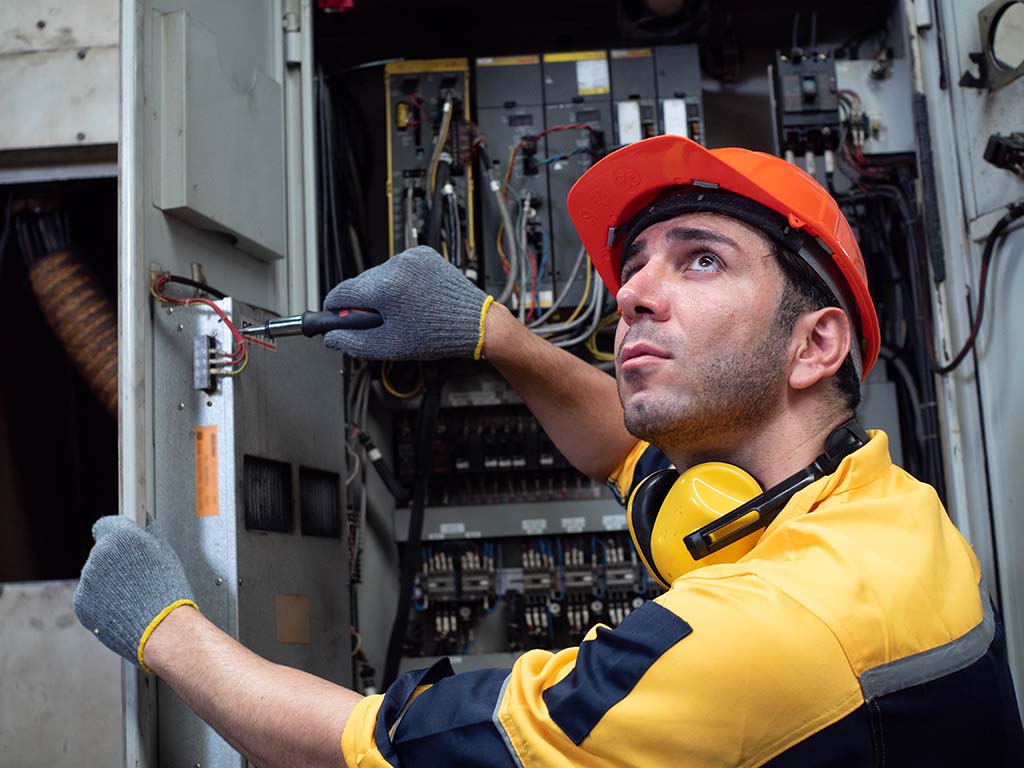
For electricians looking to take on larger-scale projects or specialise in commercial systems, this sector is rich with opportunities, from fleet EV infrastructure to full lighting control upgrades. Whether you’re subcontracting for public projects or managing facilities for businesses, there’s steady demand for skilled professionals across the board.
1. Workplace EV Charging
Electric vehicle adoption isn’t just reshaping domestic installations, it’s transforming commercial sites too. Government schemes like the Workplace Charging Scheme are incentivising companies to install EV charge points on business premises, making it easier and more cost-effective to start a rollout. However, commercial charger installs come with additional complexity.
Many businesses now require smart systems that can balance loads across multiple chargers, particularly when managing fleets. This often involves configuring energy management systems and ensuring demand doesn’t exceed the site’s supply capacity.
Electricians carrying out this work must be confident with three-phase systems, larger cable runs, distribution board upgrades, and sometimes integrating chargers with solar or storage.
2. Commercial Solar
The push for green credentials and long-term energy savings has triggered a commercial solar boom. Warehouses, schools, NHS sites, supermarkets, and factories are all leveraging unused roof space to generate electricity.
Solar installations in the commercial space grew by 25% in 2024 alone, reflecting widespread investment across sectors. Many of these projects include battery systems to store power for peak-time usage and often involve integrating backup generators to provide resilience.
Demand is especially high in the Midlands and rural parts of the Southwest, where larger roof spans and government funding have made installation more viable. This work tends to favour electricians with experience in higher-capacity systems and energy regulation compliance.
3. Lighting Retrofits & Building Controls
The 2023 ban on most fluorescent lighting under the RoHS directive has pushed a wave of lighting upgrades across the UK. Offices, shops, public buildings, and schools are now replacing legacy lighting with modern, energy-efficient LED solutions.
These retrofits are typically done at scale, entire floors, campuses, or buildings at a time and often bundled with smart lighting controls. This includes motion sensors, dimming modules, daylight-responsive systems, and timers to improve energy efficiency and meet building performance targets.
Electricians are central to planning and installing these systems, and familiarity with building management systems (BMS) and control wiring is increasingly valuable in this space.
4. Ongoing Testing, PAT & Maintenance
Compliance is non-negotiable for commercial clients, which creates consistent demand for electricians who offer testing and long-term maintenance services. Under BS 7671, periodic inspections are required every five years in commercial environments, but many businesses schedule them more frequently for insurance and operational safety.
Portable appliance testing (PAT) is often outsourced, providing additional work for electricians across offices, hotels, schools, and retail spaces. Many organisations also enter into ongoing maintenance contracts that include regular system checks, fault finding, and minor repairs.
Services like surge protection, AFDD installation, and emergency lighting maintenance are also in demand, especially as businesses aim to reduce risk and enhance safety across their premises.
New build opportunities
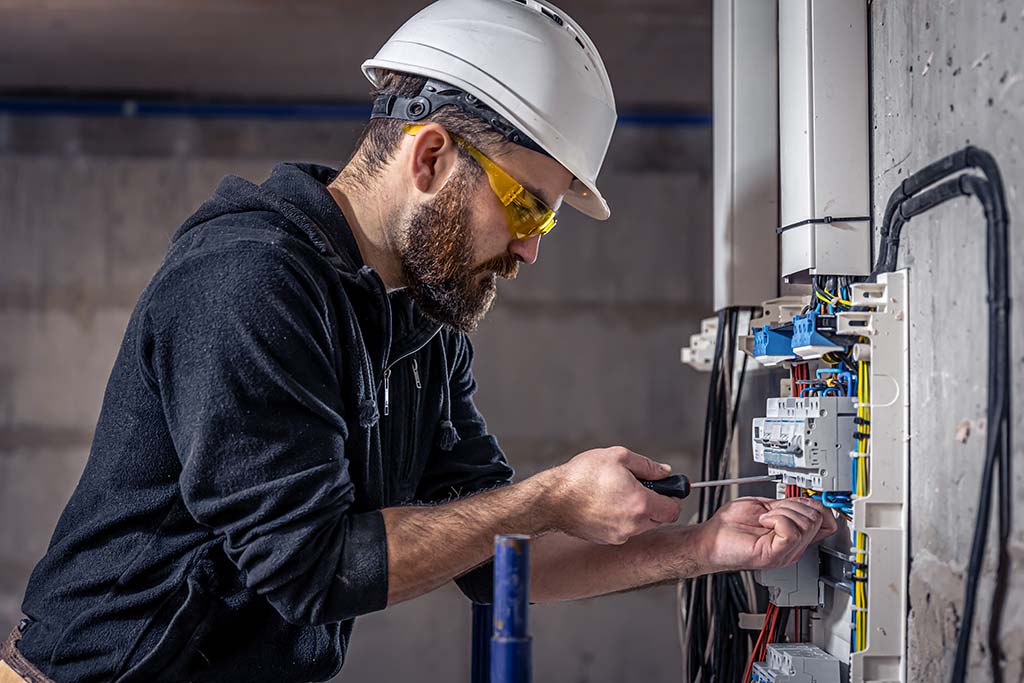
From large-scale housing developments to smarter, greener commercial premises, electricians have a key role in shaping the electrical systems of tomorrow. New build projects offer structured, high-volume work, often with cutting-edge technologies built into the spec. For electricians looking for consistent, forward-looking contracts, this is a safe bet for the future.
1. Full House/Flat Wiring
New build housing continues to be a stronghold for electrical contractors, with over 220,000 homes completed in the last year alone. First-fix and second-fix wiring work remains the core of residential new build projects, often handled at scale across entire estates.
What’s changed is what clients now expect: every new home must include provisions for EV charge points, and many also come equipped with solar panels, electric heating systems, and smart-ready wiring.
Electricians working on these sites need to be confident in both standard installations and the additional requirements of modern energy systems and compliance frameworks.
2. Smart-Ready Homes
Homebuyers are increasingly expecting smart features from the moment they walk in the door. Builders are responding by integrating structured cabling for data and telecoms, smart door entry systems, and connected heating controls right from the construction phase.
Electricians who can wire both power and data, or who understand how to install and test smart devices like thermostats and doorbell cameras, are in particularly high demand. A basic knowledge of networking and low-voltage wiring systems will give electricians an edge in this fast-developing area.
3. Electric Heating
With the UK’s transition away from gas boilers in full swing, new homes built from 2025 are expected to be gas-free by default. This shift creates a growing need for electrical heating infrastructure, including high-current feeds for immersion tanks, electric panel heaters, and air-source or ground-source heat pumps.
These systems often require load calculations, new circuit design, and careful distribution board planning, giving electricians more technical work on each install. As gas disappears from the blueprint, electric heating will be one of the defining features of new homes, making it a must-know area for installers.
4. Regulations & Safety
Electrical safety and efficiency standards are tightening with each update to the wiring regulations, and all new builds must comply with the 18th Edition (Amendment 2). This includes mandatory use of surge protection devices (SPDs), arc fault detection devices (AFDDs) in some circuits, and RCDs across the board. Installers must not only ensure compliance but also design systems that meet environmental and energy-use targets.
For electricians, staying updated on changes to BS 7671 and understanding how to implement them on-site is essential, particularly in new build environments where inspections and certifications are closely monitored.
Regional hotspots to watch
| Region | Key Trends |
| London | Highest charger density, smart office refits |
| Southeast | Top for home solar and EV charger demand |
| Southwest | Highest % of solar homes, rural energy upgrades |
| Midlands | Industrial solar boom, new housing developments |
| Scotland | Leading public EV infrastructure, wind/solar installs |
| Wales/NI | Steady demand; public-funded retrofit projects |
How to stay ahead
The next two years are pivotal for the electrical trade in the UK. Regulations, green tech, and customer expectations are aligning to create a strong, sustained demand for skilled electricians.
To take advantage:
- Get certified for solar and EV installs (e.g., NICEIC, MCS, OZEV).
- Stay updated on BS 7671 and green energy incentives.
- Consider partnering with smart home tech suppliers or taking IT training.
- Market your services around upcoming regulatory deadlines (like EICRs).
Whether you’re just starting out or growing your team, focusing on these high-demand areas can ensure a busy, profitable future.
Remember: The future is electric – and electricians are powering the change.
Sources: Checkatrade, gov.uk, SunSave, EquipTest, The Guardian, The Logical Group, Fixflo, EcoGreen Electrical, LearnTradeSkills, Weiss Technik, NHBC, Statista, OpenRent, Rentokil
Get Specialist Electricians’ Insurance from Protectivity
If you’re working on a self-employed basis or running your own electrician business where you’re employing other people, then having your own cover in place is a must. If something goes wrong, the financial implications can be severe, which is why having the correct tradesman insurance is essential.
At Protectivity, we specialise in providing electricians’ insurance to professionals just like you. Our policies include public liability up to £5 million as standard; you then have the option to add Employers’ Liability insurance, Contractor Works cover, Plant and Tools cover, financial loss and employee tools (only if you’ve included the other benefits). That way, when unforeseen circumstances occur, you can ensure you’re protected from unexpected costs. Our tools insurance, is ideal for electricians needing to protect their equipment.
Find out more about our affordable policies, excellent claims handling, and monthly payment options when you request a quote today.
Get Electricians' Insurance from Protectivity
*Disclaimer – This blog has been created as general information and should not be taken as advice. Make sure you have the correct level of insurance for your requirements and always review policy documentation. Information is factually accurate at the time of publishing but may have become out of date.
Last updated by




